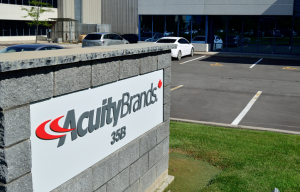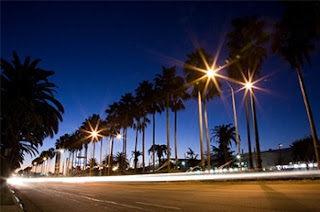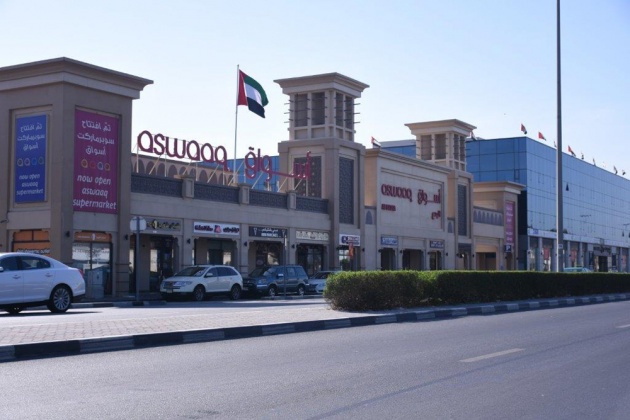TAG | connected lighting
The company is hoping to expand its catalogue of IoT offerings, by bringing luminaires and building management controls together.
IoT sensors implanted in LEDs have the ability to collect analytical information on the behaviour of the people that use a building, offering information on how long people stay in a room, for example, and during what hours of the day.
Acuity has devised software that will offer an array of capabilities, including indoor positioning, asset tracking, space utilisation, spatial analytics and energy management.
The company unveiled its new product, Atrius, at Lightfair in Philadelphia, which, the firm hopes will advance Acuity’s IoT products, making them much more sensory.
‘Lights are installed throughout most of our indoor and outdoor spaces. In addition, lights are powered and connected, and with the emergence of LED lighting, they now feature onboard intelligence.’
The product can help employees find available meeting rooms, empower travelers to navigate busy airports, guide shoppers to a specific product on a store shelf or permit a retailer to receive an alert that a customer needs sales assistance.
‘Lights are installed throughout most of our indoor and outdoor spaces. In addition, lights are powered and connected, and with the emergence of LED lighting, they now feature onboard intelligence,’ commented Greg Carter, vice president and general manager of Atrius.
‘That’s why we believe LED lighting is the best and least expensive infrastructure for delivering a sensory network that feeds IoT platforms to connect systems, spaces and people.’
Atrius IoT applications utilise LED lighting infrastructure rather than requiring additional equipment like stand-alone beacons or dedicated IoT networks, bringing a faster return-on-investment.
As IoT technology improves, upgrades are simple and cost effective. Further, the conversion of conventional lighting to LED lighting can provide the energy savings to help fund evolving IoT capabilities.
acuity brands · connected lighting · indoor positioning · internet of things · iot · Novel Energy Lighting · spatial analytics
12
Lighting industry needs to ‘wake up’ to IoT hack threat
Comments off · Posted by admin in LED
 |
| Ken Munro, the UK’s leading ‘ethical hacker’ speaking at this year’s LuxLive |
connected home technologies · connected lighting · internet of things · iot · iot security · led lighting · Novel Energy Lighting · trojan horse
4
LA installs street light sensors that can hear car crashes
Comments off · Posted by admin in LED
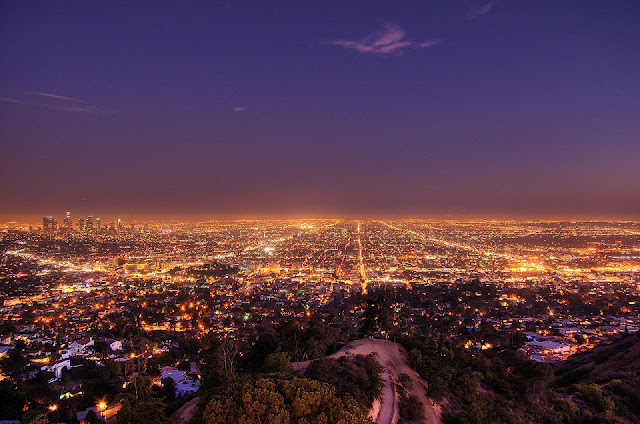 |
| LA’s is all set to expand its smart city capabilities by installing all hearing street lights |
Los Angeles is adding all-hearing sensors to street lights that will be able to hear car crashes and report them to emergency services and first responders.
The move is part of a new pilot scheme to expand LA’s smart city capabilities. The city authorities intend to use the smart city to improve public safety and support services.
The city already has a connected street lighting infrastructure, but new technology is being deployed to improve LA’s Internet of Things (IoT) functionality.
Enabled light poles will feature microphone modules that will be able to monitor, aggregate and visualize ambient sound in various areas of the city.
The modules can be used to increase the response times of emergency vehicles by detecting the sound of a collision. They can also be used to monitor noise and emission levels.
‘We generally have a very rudimentary understanding of how noise and sound propagate in public and open spaces in the city,’ commented Dietmar Offenhuber, assistant professor at Northeastern University.
‘By attaching sound sensors to street lighting infrastructure, we get for the first time a very articulated and diverse reading of the urban soundscape. This very granular information allows us to understand how the city and the soundscape influence and impact one another.’
‘By attaching sound sensors to street lighting infrastructure, we get for the first time a very articulated and diverse reading of the urban soundscape.’
Los Angeles currently has more than 200,000 street lights installed throughout the city, which equates to being one of the largest street-lighting networks in the world.
‘If we imagine that every light pole can collect all kinds of data then there is so much more value that street lighting can afford to our citizens in addition to providing illumination,’ commented Ed Ebrahimian, director of the Bureau of Street Lighting for the City of Los Angeles.
Last year, the Los Angeles Bureau of Street Lighting began to install a connected street lighting management system developed by Philips, which uses existing mobile networks and cloud-based technologies to control street lights and analyse how much energy each light is consuming.
connected lighting · intelligent cities · intelligent street lights · Novel Energy Lighting · streetlight sensors
24
Philips Lighting @ L+B 2016 – Experience light beyond illumination
Comments off · Posted by admin in LED, Philips LED
Philips Lighting showcased truly pioneering lighting innovations at Light + Building 2016, the world’s leading trade fair for lighting in Frankfurt, Germany.
Philips brought together leading experts to inspire and engage fellow professionals as part of their speaker program at light+building.
Connected lighting in smart cities
Delivering smart buildings
New technology trends and their impact on LED luminaires
We’ve captured these insightful talks in a series of videos – so if you couldn’t make it to the show, here’s your chance to catch up on what you missed.
connected lighting · iot · LED technology · light and building 2016 · Novel Energy Lighting · philips led · philips lighting · smart buildings · smart cities
A looming skills shortage could derail the revolution in connected lighting – unless action is taken to train a generation of contractors. PLUS: Customer who spent $150 million on lighting says pace of technological development is ‘overwhelming’. Lux Today webcast for May 17 2016 with Courtney Ferguson.
connected lighting · gooee · led lighting · lifi · lighting skills · lux lighting · Novel Energy Lighting
24
Dubai supermarket is first with connected lighting
Comments off · Posted by admin in Uncategorized
Customers use the app to receive information relevant to the items around them such as special offers and they can even look up prices of items on their phone instead of on the shelves.
Lux reports: UAE supermarket chain Aswaaq has become the first retailer in the Middle East to install connected lighting which communicates with its customers.
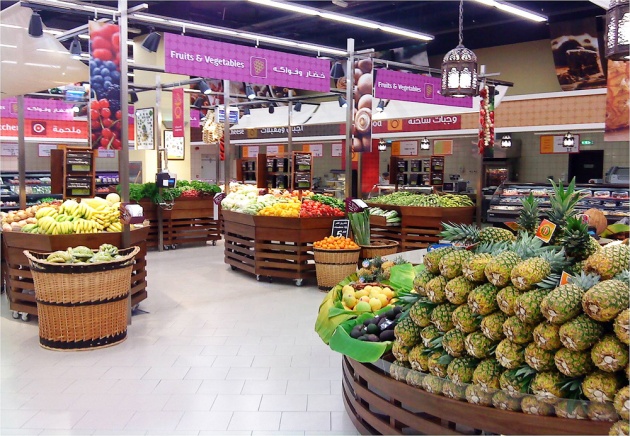
Its supermarket in Al Bada’a, Dubai, now boasts so-called Visible Light Communication technology, which is imperceptible to the human eye but detected by smart phone cameras. The lights act as a positioning system which allows shoppers to find items in the store to an accuracy of 30cm.
Smart-phone owners must first download the Aswaaq-branded app. This allows their phone to communicate with the individual light points transmitting their location through the high-frequency modulation of the light. The data stream is one-way and no personal data is collected by the lighting system.
They use the app to receive information relevant to the items around them such as special offers and they can even look up prices of items on their phone instead of on the shelves. The store managers can use the system to identify the most popular areas of the store to better place products, as well as help streamline tasks such as stock checks and restocking shelves.
The project has been installed by Philips Lighting and an American specialist in ‘digital store mapping’, Aisle411.
Other retailers trialling visible light communication include Target in the US, and Carrefour at its hypermarket in Lille, France.
connected lighting · led lighting · lifi · Novel Energy Lighting · supermarket lifi · supermarket lighting · visible light communication
27
Philips: Smart lighting can neutralise the age differences in your office
Comments off · Posted by admin in LED, LED downlights, LED GU10, LED panels, LED Spots, Philips LED
Something for everyone: Whether your eyes are fresh out of university, or approaching retirement, Philips Connected Lighting allows you to adjust the office lighting to your needs. Photo is from pcruciatti via Shutterstock
Enough of that, says Philips, which is calling for ‘personalised lighting in your workplace’ to assure that employees of all ages work under the correct, individualised lighting conditions that allow them not only see (what a concept!) but, even better, to produce.
It’s part of the Dutch giant’s efforts to market its ‘Connected Lighting for offices’, which it first introduced a year ago and which it has showcased at The Edge, the environmentally heralded Amsterdam offices of consulting firm Deloitte. The system allows workers to use smartphone apps that adjust overhead lights individually. The lights are connected to an ethernet network, with each light having its own internet address.
‘A 45+ worker tends to need almost double the light needed by a 20 year old for everyday tasks,’ the Dutch lighting gaint says in a press release. ‘The one-light-for-all principle is outdated at a time when we are all living and working longer. Today 30-50 per cent of people in work are over 45 years old…Over the age of 45, people begin to experience a deterioration of their near-sight vision. Research shows, a 60-year-old person needs between two and five times as much light as a 20-year-old to see the same visual detail, let alone to concentrate.’
The wrong lighting could even undermine health and productivity, Philips says.
‘People often call off sick due to headaches and fatigue,’ notes Bianca van der Zande, principle scientist at Philips Lighting. ‘These symptoms may have many underlying causes but perhaps one of these could be the result of prolonged eye-strain due to poor lighting conditions in their working lives. Inadequate lighting can lead to visual discomfort, neck pain, headaches, fatigue and perhaps eventually sick leave.’
A 2013 survey by Philips found that 90 per cent of people who could adjust desk lamps for brightness and colour temperature reported ‘sharper vision, optimum eye comfort, (and) the ability to see smaller details and improved contrast.’ It was a bit of a foregone conclusion, but the idea now is that ethernet-connected, app-controlled overhead lights can deliver the same benefits.
Philips is also calling for government regulations to mandate individualised lighting.
‘Regulatory bodies should take these findings into account for the well-being and productivity of today’s workforce,” says van der Zande.
‘People spend 80-90 per cent of their time indoors from which around 20 per cent is spent at work so the indoor environment determines to a large extent the comfort and wellbeing of the office employee, influencing their performance. It is important that human-centric lighting becomes a part of the regulatory standards, allowing architects and building designers to advise for the best solutions – not only for offices, but for all building environments.’
At long last, harmony across the generations? That would be a story for the ages.
Visit us at Novel Energy Lighting to discuss your office lighting refit, we offer the full Philips range and can provide lighting design advice as needed
connected lighting · energy efficient lighting · LED downlights · led GU10 · led lighting · led panels · led tubes · Novel Energy Lighting · office lighting · philips led

